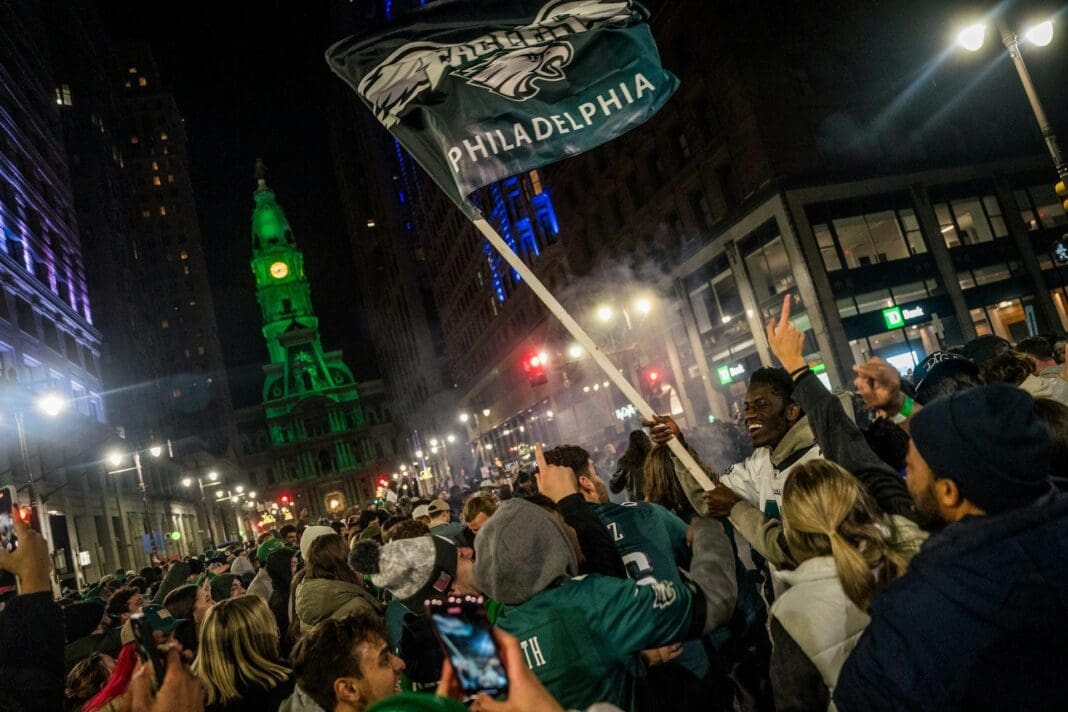If you live in the Philadelphia or Kansas City metro areas, congratulations: The fact that your city made it to the Super Bowl translates to about $200 extra in your pocket.
That’s right – whether the Philadelphia Eagles or the Kansas City Chiefs win the big game on Feb. 9, both cities have scored an economic victory. Research shows that making the playoffs alone is enough to boost personal incomes in the region. And if your team wins, you and your city will get an even bigger boost.
This windfall isn’t coming from increased merchandise sales, as you might expect. Instead, the key driver is happiness. A successful season lifts fans’ moods, which leads – indirectly – to greater spending and productivity.
I’m a macroeconomist with an interest in sports economics, and my colleague Christian End of Xavier University is a psychologist who specializes in fan behavior. Together, we published two studies combining our areas of expertise: “A Winning Proposition: The Economic Impact of Successful NFL Franchises” and “Team Success, Productivity and Economic Impact.”
In a study using data from the late 20th century and early 21st century, we found that when a team goes from zero to 11 wins – the typical number needed to make the playoffs – its home region sees an average per-person income rise by about US$200 over the year, adjusted for inflation. We also found that winning the Super Bowl was associated with a $33 bonus, again adjusted for inflation.
When you multiply $200 by the 6 million people who live in the Philadelphia metropolitan area and the 2 million in the Kansas City region, it comes out to a whole lot of money overall.
If you’ve ever been to a Super Bowl parade, you might assume that the income boost is linked to people spending more on team-related merchandise. But research shows that professional sports teams usually have a small impact on local incomes.
Even hosting the Super Bowl doesn’t seem to do that much: Our research shows that people are better off economically if their local team wins the Super Bowl than if their local area hosts one.
So if people aren’t spending more directly on the team, something else must be going on. Our work pointed to two possible explanations – both having to do with happiness.
First, we hypothesized that happier people tend to spend more. And when people spend more, that money is returned to the population through wages, so people’s incomes rise. The key here is that people are spending more on everything, not just things associated with the sports teams.
Since the football season usually finishes in December, it could be that happy parents who are fans of the local NFL team are spending more on Christmas gifts for their kids. With the Super Bowl stretching later into the winter, loved ones might get nicer flower bouquets and more chocolate for Valentine’s Day when the local team wins the Super Bowl.
The other possible path is through increased productivity. Psychology research has found that happier people are more productive. So as the season progresses and the home team keeps winning, it stands to reason that people in the area will go into work happy and work harder.
Previous research backs up this idea. For example, a 2011 study found that when the home team in Washington performs better, federal regulators are more productive. In places where private businesses dominate the local economy – which is to say, most of the rest of the U.S. – an increase in productivity would lead companies to be more profitable, which could lead to locals having higher earnings. Even nonfans see benefits when their neighbors are happier, spending more and working harder.
No matter how the Super Bowl turns out, both the Philadelphia and Kansas City metropolitan areas have already won, as both fans and nonfans in each region stand to benefit from higher incomes.
This article is republished from The Conversation, a nonprofit, independent news organization bringing you facts and trustworthy analysis to help you make sense of our complex world. It was written by: Michael Davis, Missouri University of Science and Technology
Read more: The Super Bowl’s evolution from football game to entertainment extravaganza Ads, food and gambling galore − 5 essential reads for the Super Bowl Sports gambling creates a windfall, but raises questions of integrity – here are three lessons from historic sports-betting scandals
Michael Davis does not work for, consult, own shares in or receive funding from any company or organization that would benefit from this article, and has disclosed no relevant affiliations beyond their academic appointment.








